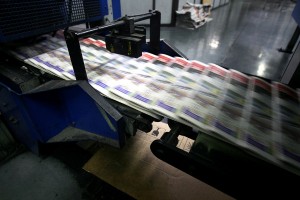The appearance in public of senior editorial members of the Independent media group in ANC garb has occasioned a vibrant if sometimes bitter debate about independence and partisanship.
What set off a lively and sometimes-acrimonious debate was an article by Daily Maverick writer Marianne Thamm, who raised the idea of journalistic “objectivity”.
She wrote: “The myth of the objective journalist has long been shattered. It never existed. Journalists are human and by nature gravitate towards specific ideologies and ways of thinking shaped by a myriad of influences and factors. We are not blank slates. Ultimately, however, our job is to monitor and to hold power to account — whatever its colours.”
One of our greatest liberal journalists, Allister Sparks, long ago questioned the use of the term.
The idea of objectivity arose in the US in the early 1900s, according to one account, because press associations serving many newspapers need to give one presentation of the facts for all newspapers.

The real problem with objectivity is not only that it assumes journalists or any person can be a completely neutral fact-sifting machine, without a particular history and position in society that shapes what and who that person understands.
The real problem is that the idea of objectivity is associated with a set of journalistic rituals that may prevent journalists seeking out the truth of a particular news event or topic.
Those rituals prefer seeking “balance” and “fairness” to getting to the bottom of what is going on.
It has even been suggested that “balance” is incompatible with objectivity, in the sense of a lack of bias.
An example of this was the quoting of the security police in every story that involved state brutality. Quite simply, the security police of apartheid South Africa could not be trusted. Reprinting their statements without subjecting them to scrutiny served only to muddy the waters, especially since the papers were banned from printing statements from the ANC. The security police lied routinely. Journalists should at least have raised big red flags when quoting them.
Another example is the Goldilocks structure of a news piece. Two opposing views are quoted, and a third viewpoint, somewhere in the middle, is proposed as the concluding truth. The middle road is not always the best place to be. What is the golden mean in an article about whether HIV causes Aids?
And yet throwing objectivity out along with ideas of perfect neutrality is dangerous. The idea that all truth is entirely constructed either individually in our own heads or socially in groups, rules out the possibility of external reality interacting with, and changing, our conceptions of truth.
For me, it makes it impossible for anyone to change their minds when confronted with evidence. The apocryphal quote from John Maynard Keynes about this is, “When the facts change, I change my mind. What do you do, sir?”
While we can dispense with “fairness” because it begs the question, “Fairness to whom?” and “balance” I don’t think it is wise to dispense with including not just “the other side” of the story but as many different voices as possible.
As a journalist, I found that the chief boon of being forced to seek the opposing point of view, based on the legal idea of “audi alteram partem” was that it sometimes changed the direction of my article entirely from its initial conception, because I encountered new evidence.
Also, an article that doesn’t quote anyone sounds dry and lifeless. An article with competing and contrasting voices has dynamism. I force myself to remember that not everyone who reads what I write will be persuaded by the main thrust of the article, and some at least may be quite pleased to see an opposite point of view. The audience doesn’t always read what we write, or hear or view what we broadcast, in the way we intend it to be read or heard or seen.
From our end of the story, a complete absence of “bias”, which is how objectivity is sometimes framed, is clearly not possible. So, yes, we should be careful about assuming that our own ideas, political and economic are God-given and common sense, not a product of our education, our personal and political histories, and our experiences. And yes, we should respect the views of others, especially the views of those people who do not get much attention because they lack power or status.
But we can’t function as journalists if we believe there is no version of events that captures reality better than others. And let’s be clear. This is not a simple matter of being a “mirror”. Facts are not lying around like pebbles to be picked up. It often takes hard work to filter out fact from rumour, assertion and counter-assertion, and even data.
So what do we do? The best answer I have come across is the approach proposed by Bill Kovach and Tom Rosenstiel, in their book The Elements of Journalism.
Their answer is the “journalism of verification”, making the task of seeking the truth central to the profession of journalism.
The final, absolute truth is impossible, since even science changes its mind, frequently, but that doesn’t mean we cannot aim at the best approximation of truth. If we are in the business simply of asserting different truths, we might as well write poetry. There have been times when I have considered this, but the audience expects something else.
To reiterate: as journalists we are in the business of trying to establish the truth, however difficult this may be. As Kovach and Rosenstiel write, “The first principle of journalism – its disinterested pursuit of the truth – is ultimately what sets it apart from all other forms of communication”.



